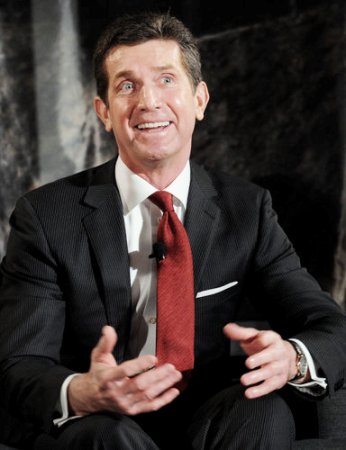Drug maker Johnson & Johnson agreed to pay $2.2 billion and plead guilty to a misdemeanor in marketing the antipsychotic drug Risperdal and other drugs.

“The agreement,” The New York Times writes (Nov. 4), “is the third-largest pharmaceutical settlement in United States history and the largest in a string of recent cases involving the marketing of antipsychotic and anti-seizure drugs to older dementia patients. It is part of a decade-long effort by the federal government to hold the health care giant — and other pharmaceutical companies — accountable for illegally marketing the drugs as a way to control patients with dementia in nursing homes and children with certain behavioral disabilities, despite the health risks of the drugs.
“Much of the conduct highlighted in the case, which for Risperdal extends from 1999 through 2005, occurred while Alex Gorsky (pictured) was vice president for sales and marketing and later president of the company’s pharmaceutical unit, Janssen. Mr. Gorsky became chief executive of Johnson & Johnson last year. Risperdal, which has lost its patent protection, was once one of the company’s best-selling drugs.”
“Prosecutors alleged, The Wall Street Journal says (Nov. 4), “that J&J’s Janssen Pharmaceuticals unit promoted Risperdal to elderly patients suffering from dementia, despite no approval for that use. Prosecutors also alleged that J&J’s ‘ElderCare’ sales force pushed Risperdal for use in these elderly patients, and sales representatives’ bonus awards failed to distinguish prescriptions for schizophrenia or the unapproved dementia use.”
I don’t know if or when Mr. Gorsky received his training regarding J&J’s standards and practices, but apparently it didn’t take.
For my 2004 book, What Do You Stand For?, former Johnson & Johnson CEO James Burke reflected on his decision-making during the Tylenol poisonings that took place in Chicago in 1982.
“I think that the only way that we could have done what we did was to have all of the institutions, that were affected by theTylenol poisonings, believe in us. And I want to emphasize, believe in us, the company. Whether that was the head of the FBI or the head of the FDA or people that we spoke to in Congress or the people at the White House, is you look back and realize how quickly the country responded to that issue. It wasn’t just what we did. The country had to respond in a myriad of ways. And they responded and listened to our advice because they trusted the institution from which that advice was coming.
“There was no lack of trust about Johnson & Johnson. There was no thought that this was something that we were doing that was only in our own self-interest. And that came from a hundred years of experience. I think they trusted me largely because I represented an institution that had been around for a hundred years and had earned the trust of all of its constituency.”
Recent evidence makes clear that Mr. Gorsky chose to abandon that trust in favor of self-interest and profit.
At a press conference, U.S. Attorney General Eric Holder said that Johnson & Johnson “displayed a reckless indifference to the safety of the American people, and it constitutes a clear abuse of the public trust, showing a blatant disregard for systems and laws designed to protect public health.”
And what lessons did the company learn from the action?
“Johnson & Johnson said on Monday that it stood by the safety and efficacy of Risperdal and was trying to put the chapter to rest. ‘This resolution allows us to move forward and continue to focus on delivering innovative solutions that improve and enhance the well-being of patients around the world,’ Michael Ullman, the company’s vice president and general counsel, said in a statement.”
I asked Burke about the corporate lessons learned after Tylenol
“My belief is that those institutions that survive over time are those that have the better consumer franchise because the consumer, collectively, is smarter than any of us are individually. If they’re allowed to speak, and if leadership is listening to them, over time, better decisions will be made and that’s what happened to us. We were going out every single day talking to all kinds of people to get their feelings about what we were doing.
Did you come away with anything from the crisis that had an influence on your own standards, your own principles, I asked.
“Well, yes,” Burke said. “I personally believed that we could save the product. We were not going to lose the business. But I never envisioned the extraordinarily positive effective on the future of that business because of our behavior. I thought we might save 60-70% of the business and it’s probably fifteentimes as big as it was now. And I think a lot of that was the cumulative sense of trust that the public evidenced by buying our product. I think the experience confirmed my own deep belief that you can do well by doing good. That’s a buzzword phrase, but I think it’s true. I think that the more we do that’s right, the more successful we are as individuals and as institutions.”
Despite the fine and guilty plea, CEO Alex Gorsky offered no personal explanation or statement… and he gets to keep his job. Ernie Knewitz, a spokesman for Johnson & Johnson, said “Mr. Gorsky has been an outstanding Johnson & Johnson leader for more than 20 years.”
I wonder what James Burke would say.
Comments










